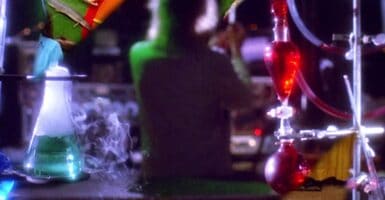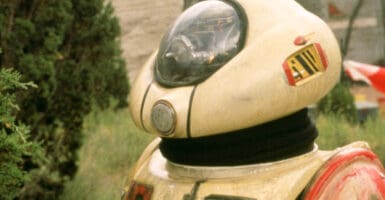Japanese Robot Never Loses At Rock, Paper, Scissors
This article is more than 2 years old
Well, the human race is screwed. The long list of tasks that robots can perform better than humans has an addition, and it’s one that will affect countless decisions from now until the end of time: rock, paper, scissors.
The Ishikawa Oku Laboratory in Japan has developed a robot called Janken that is literally unbeatable at the game. But Janken has a dirty little secret — it’s actually a cheater. It’s not just sore losers who say so, either. Its makers admit that it has an unfair advantage in playing RPS — namely, that it has high-speed computer vision capable of detecting movements in the opponent’s hand and then formulating a winning move in response.
Janken can detect an opponent’s movements in one millisecond. A millisecond is .001 seconds, or if you prefer analogies, a millisecond is to a second what a second is to 16 minutes. The point? It’s damn quick. Not only can Janken decipher someone else’s movements, but it can shape its own in 20 milliseconds. Given that it takes the human eye about 40 milliseconds simply to process a moving image, human opponents don’t stand a chance.
Janken is actually the second version of the RPS-playing robot. The first one was a bit slower — 20 milliseconds slower than a human opponent, in fact. But no robot stays behind for long, and Janken is no exception. But the Ishikawa Oku Laboratory doesn’t envision robots such as Janken as being competitive with humans — it hopes that such abilities will make robots able to collaborate with humans.
The skills displayed by Janken could have broader applications, especially when it comes to robots working in factories and performing manual or dangerous labor. Robots with the ability to process and react to visual information as quickly as Jenken could improve efficiency and safety at job sites, and if an accident does occur, the robots would presumably be able to react faster. The eventual hope is that these high-speed reactions could be combined with the ability to make high-speed predictions. By then, though, I’m guessing the robots would be on to more complicated games.
Janken isn’t the first robot to play RPS. Berti is a robot developed by the Bristol Robotics Laboratory and Elumotion in Bath, England. Berti is designed to mimic human gestures to give scientists insight into how humans reacts to robots. One of the first things Berti learned to do was play the game, but unlike Janken, Berti knows whether it’s won based on data gleaned from its opponent’s sensor glove. Clearly, great minds think alike. But perhaps great robots do too. Here’s hoping that we get a Jenken vs. Berti rock, paper, scissors throwdown in the near future!












